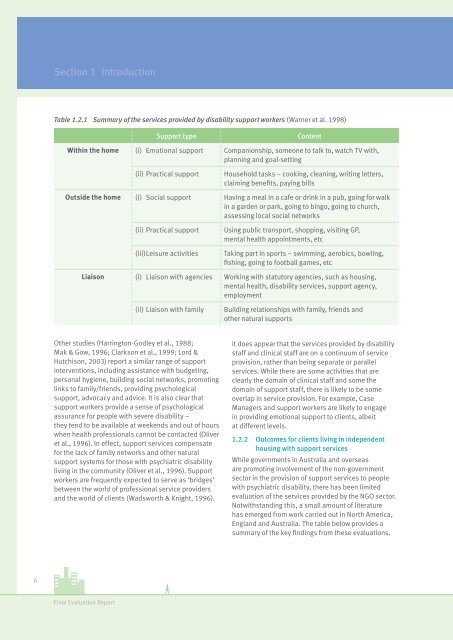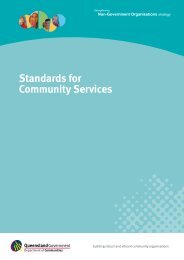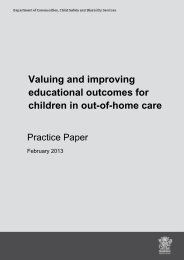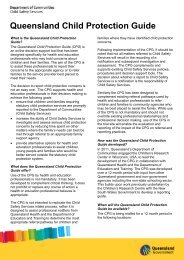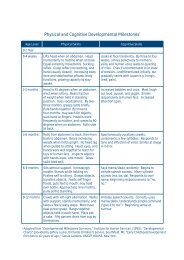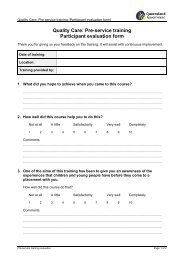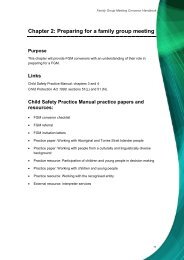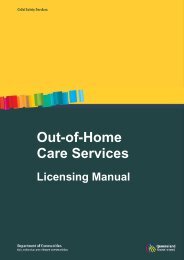Housing and Support Program (HASP): Final Evaluation Report
Housing and Support Program (HASP): Final Evaluation Report
Housing and Support Program (HASP): Final Evaluation Report
You also want an ePaper? Increase the reach of your titles
YUMPU automatically turns print PDFs into web optimized ePapers that Google loves.
6<br />
Section 1 Introduction<br />
Table 1.2.1 Summary of the services provided by disability support workers (Warner et al. 1998)<br />
<strong>Final</strong> <strong>Evaluation</strong> <strong>Report</strong><br />
<strong>Support</strong> type Content<br />
Within the home (i) Emotional support Companionship, someone to talk to, watch TV with,<br />
planning <strong>and</strong> goal-setting<br />
(ii) Practical support Household tasks – cooking, cleaning, writing letters,<br />
claiming benefi ts, paying bills<br />
Outside the home (i) Social support Having a meal in a cafe or drink in a pub, going for walk<br />
in a garden or park, going to bingo, going to church,<br />
assessing local social networks<br />
(ii) Practical support Using public transport, shopping, visiting GP,<br />
mental health appointments, etc<br />
(iii) Leisure activities Taking part in sports – swimming, aerobics, bowling,<br />
fi shing, going to football games, etc<br />
Liaison (i) Liaison with agencies Working with statutory agencies, such as housing,<br />
mental health, disability services, support agency,<br />
employment<br />
(ii) Liaison with family Building relationships with family, friends <strong>and</strong><br />
other natural supports<br />
Other studies (Harrington-Godley et al., 1988;<br />
Mak & Gow, 1996; Clarkson et al., 1999; Lord &<br />
Hutchison, 2003) report a similar range of support<br />
interventions, including assistance with budgeting,<br />
personal hygiene, building social networks, promoting<br />
links to family/friends, providing psychological<br />
support, advocacy <strong>and</strong> advice. It is also clear that<br />
support workers provide a sense of psychological<br />
assurance for people with severe disability –<br />
they tend to be available at weekends <strong>and</strong> out of hours<br />
when health professionals cannot be contacted (Oliver<br />
et al., 1996). In effect, support services compensate<br />
for the lack of family networks <strong>and</strong> other natural<br />
support systems for those with psychiatric disability<br />
living in the community (Oliver et al., 1996). <strong>Support</strong><br />
workers are frequently expected to serve as ‘bridges’<br />
between the world of professional service providers<br />
<strong>and</strong> the world of clients (Wadsworth & Knight, 1996).<br />
It does appear that the services provided by disability<br />
staff <strong>and</strong> clinical staff are on a continuum of service<br />
provision, rather than being separate or parallel<br />
services. While there are some activities that are<br />
clearly the domain of clinical staff <strong>and</strong> some the<br />
domain of support staff, there is likely to be some<br />
overlap in service provision. For example, Case<br />
Managers <strong>and</strong> support workers are likely to engage<br />
in providing emotional support to clients, albeit<br />
at different levels.<br />
1.2.2 Outcomes for clients living in independent<br />
housing with support services<br />
While governments in Australia <strong>and</strong> overseas<br />
are promoting involvement of the non-government<br />
sector in the provision of support services to people<br />
with psychiatric disability, there has been limited<br />
evaluation of the services provided by the NGO sector.<br />
Notwithst<strong>and</strong>ing this, a small amount of literature<br />
has emerged from work carried out in North America,<br />
Engl<strong>and</strong> <strong>and</strong> Australia. The table below provides a<br />
summary of the key fi ndings from these evaluations.


